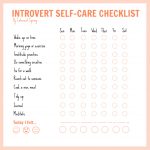INFJs always have a difficult time saying no. Using this word in conversations is quite challenging for our personality type, which is famous for being people oriented. “No” is closely connected with INFJ self-care, and that’s something I learned the hard way when I was a teen.
How one word changed everything
When I was a teenager, every aspect of INFJ self-care was unknown to me. I had no idea how to say no to anyone. I’m going to share something deeply personal with you that not many people know about me.
I already talked about the bullying I went through when I was younger, but that actually wasn’t the worst part. What hurt me the most during these sensitive years was the lack of family protection. The root of my inability to say no back then came from not having anyone to show me its benefits.
But something good came out of that period. I understood the need to stand my ground and look at self-care as a means to protect myself. Everything changed for the better when I said no to my bullies, and to the family that was supposed to support me. That moment changed my life forever.
Twelve years later, I still follow the same INFJ self-care rules I applied back then. This is the first time I’m publicly sharing my secret win-win advice on how to say no and protect yourself as an INFJ.
Saying no doesn’t make you arrogant
It’s ridiculously hard for an INFJ to decline an invitation or a proposition. It’s not because we don’t know how to speak for ourselves, but because we hate confrontation. INFJs would rather go against our own beliefs, than enter a heated argument.
Don’t worry my dear INFJ, there’s a solution.
The next time that everything inside of you screams to say no to an unreasonable request, or to go to that crowded party, write this down:
“When I say no to others, I’m saying yes to myself.”
Similar to meditation, this works as a self-recognition principle. You’re giving yourself the permission not to do something that makes you feel bad. You’re also receiving that INFJ self-care you rightfully deserve.
Write this on a piece of paper and wear it with you. Or memorize it, it’s your choice. After a few repetitions, you’ll feel the same relief that I felt many years ago.
This is just the first half of the equation. The second one is more difficult, but it’s a game changer.
INFJ self-care is a necessity, not an obstacle
Now that you know how to say no, it’s time I tell you how to protect yourself as an INFJ.
I want you to imagine a balloon filled with helium. It’s strapped to the ground with a rope, but it wants to fly away. That wonderfully rainbow colored balloon is you, and the rope represents the people and situations holding you down. You have two solutions:
• Disconnect from the ones who don’t fully accept you, just like you would do with the rope and the balloon would fly into freedom. Notice you’re not hurting anyone, but you are liberating yourself.
• Apply what I call: “The free air rule”. Gently take the rope off, and redirect the flight toward time to yourself, not the ones who used you. In a matter of days you’ll notice the positive shift in your energy flow, and the excess of self-acceptance you’re feeling.
This is not a situation where you can lose. If you want to give yourself self-care as an INFJ, you need to make changes that won’t be comfortable. Taking care of who you are and listening to your own voice are the most valuable assets you’ll ever have.
Looking after yourself is a must
The quality of your relationships is directly proportional to the level of attention you give to yourself. That’s why these two effective tools I shared work so well, because they focus on one person, you. I’m more than happy to remind you that you’re worthy of that INFJ self-care. You always were. ☺
Sign up for our new Introvert Spring INFJ forum and share your thoughts in a safe environment. You’ll gain access to unique INFJ blog posts, INFJ discussions, private messaging, webinars, ebooks, and so much more. Go here to check out the new INFJ forum.
Now, over to you
How often do you say no in everyday conversations, and use it as a means to protect yourself? I would love to hear what you think about this, so feel free to share your thoughts in the comment section below.
Love,
Marko













I love this! While I love spending some quality time with people, I’m seriously the happiest when I’m alone with myself and my thoughts. It’s how I recharge my batteries. I no longer feel a need to make up excuses to get out of plans. The people who truly know me understand.
Glad you like the article Pam! Solitude is indeed priceless for INFJs, especially when you have people in your life who understand it. Thanks for sharing your thoughts. 🙂
I am uncomfortable with saying no but still do so. As a teenager and in my early twenties I tolerated a lot of crap. Like you I was bullied and it greatly affected my confidence and resilience.
Through the bullying I became even more of an introvert. I went “into myself” as way of protecting myself and becoming invisible.
I’m sorry you had to go through what I did Phoenicia. It’s a real challenge to face this, especially during those sensitive years. But I’m glad to hear that despite being comfortable sometimes, you say no to what doesn’t make you happy. 🙂
I love this article. I also went through bullying as. A teenager and also when I got older, also with no support. Thankyou.
You are most welcome Pam, I’m glad you like the article. 🙂 I understand you, all too well. I’m sorry you had to go through this.
This is good advice. I didn’t know I was INFJ till my late fifties. Always felt so different from others. And I actually thought there was something wrong with me. I chased people and groups of people thinking “please like me, please accept me”. And the people pleasing would begin. It’s exhausting, doing what you don’t want to do, but feeling that you MUST PLEASE THEM. It’s only after I discovered pinterest, that these letters were always passing through my main board. I took the test and it changed my life. And now, if someone can’t offer me a better time than I have with myself, I can say no. and stay home. Thank you for reaching out.
Thanks for your comment Lisa! I understand the feeling you had, but know there is nothing wrong with you, there never was. You have a wonderful personality that is both unique and amazing. 🙂
Wow, yes, I get a bad feeling first when I hear of plans I don’t want to participate in, but I don’t know what is the need for the bad feeling. I have to give myself time to tune in to what is going on with me, then an epiphany will occur and the aha moment happens. I then have to remind myself to verbalise this to my spouse or whoever is asking the tricky thing of me. I have only very recently understood this process, but boy does it feel good! I am 55 years old, better late than never! 🙂
Thanks for sharing this, Teri! I’m glad you understand this process, and don’t worry, it’s never too late. 🙂
i always thought there was something wrong with me because people, usually my own family told me “you are awfully quiet. Are you ok?” or “You need to get out there more and socialize and make new friends” Or “you just live in your own little world don’t you? I was in my 50’s before I realized there is nothing wrong with me. I read a wonderful book called “The Introvert Advantage” and it changed my life. I now embrace my introversion and I am happy to correct anyone who tells me “you shouldn’t be so shy ” or “you need to be more outgoing”. No. No I don’t.
Good to hear you embraced being who you are, Brenda! Thanks so much for sharing! 🙂
Thank you so much for this! It really helps to reframe the no as a positive thing that I’m doing for myself.
You are most welcome Heather! 🙂 I’m so glad the article helped you in this!
I love this! You did such an awesome job with this article. I just wrote an article on a very similar subject regarding INFJ’s (setting boundaries). I love where you mention that by saying no, ” you’re giving yourself the permission not to do something that makes you feel bad.” That is so true and a great way to see that.
Thanks so much for taking the time to share this!
Thank you so much, Carise! I’m deeply humbled to read your words, thank you. 🙂
I wish I hadn’t forgotten this before I got really burned out being a Physical Therapist Assistant. If I had told my boss no, not putting up with that crap, after she went around the office asking how my coworkers felt about me, if they were comfortable working with me, I more than likely would not have stayed long enough to have gotten hurt on the job. I should have packed up my crap and walked out of there right then.
But I didn’t. Because I forgot about me.
Don’t worry, Cyndi, you still have enough time to take care of yourself, too. 🙂 You got my support. 🙂